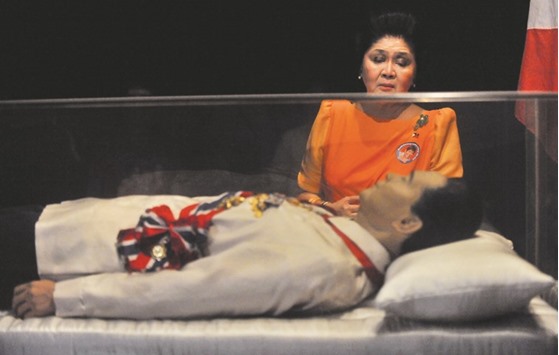The Philippines has begun preparations for the burial of late dictator Ferdinand Marcos at a cemetery for national heroes, a decision that drew criticism from the vice president and could polarise the country.
President Rodrigo Duterte said he was fulfilling a campaign promise to have Marcos, who ruled with an iron fist for two decades, interred at the heroes’ cemetery as a former president and soldier.
On Sunday, Defence Secretary Delfin Lorenzana assigned armed forces chief of staff General Ricardo Visaya, to handle arrangements for the burial next month, in line with “the verbal order of the president to implement his campaign promise”.
“I am just implementing a presidential directive, whatever I think is immaterial,” Lorenzana told reporters yesterday.
“He deserved to be buried at the heroes’ cemetery based on the criteria from the military regulations.”
Marcos was a soldier and guerrilla leader during World War Two when the former US
colony was occupied by Japanese forces.
As a dictator in the 1970s and ’80s, Marcos, his family and cronies amassed an estimated $10bn in ill-gotten wealth and thousands of suspected communist rebels and political foes were killed.
His wife, Imelda, denies amassing wealth illegally.
Vice-President Leni Robredo said she opposed Duterte’s decision to transfer the strongman’s remains from his home town of Batac in the northern Philippines to the cemetery.
“Mr Marcos is no hero,” she said in a statement. “How can we allow a hero’s burial for a man who has plundered our country and was responsible for the death and disappearance of many Filipinos?”
Robredo, a human rights advocate, defeated the dictator’s son and namesake, Ferdinand Marcos, in a vote for the vice presidency in May.
She said Duterte’s decision would not bring unity but would “deepen the unhealed wounds” of Marcos’ victims.
Some Roman Catholic bishops and left-wing activists also opposed Marcos’ burial.
“It is a great insult,” said one prominent bishop, Arturo Bastes.
Duterte brushed off the criticism.
“I see nothing wrong in having Marcos buried at the Libingan ng mga Bayani,” the president said in a speech to soldiers on Sunday, referring to the cemetery.
Meanwhile Philippine activists and a historical body have criticised President Duterte’s plan to give Marcos a hero’s burial, saying the ex-leader lied about his military record.
The National Historical Commission of the Philippines released a study over the weekend questioning Duterte’s stand that Marcos was qualified for a hero’s burial because he was a soldier during World War II.
“Marcos lied about receiving US medals... (his) military record is fraught with myths, factual inconsistencies,” the agency said.
“A doubtful record does not serve as sound, unassailable basis of historical recognition of any sort, let alone burial in a site intended, as its name suggests, for heroes.”
The activists urged the president to reconsider.
“We call on President Duterte not to give a platform for the Marcoses to whitewash the crimes they committed. This man does not deserve any form of honour,” said Tinay Palabay, secretary general of rights group Karapatan.
Former lawmaker Satur Ocampo, tortured and imprisoned during martial law, said a hero’s burial for Marcos would not bring national closure as Duterte promised.
“Disunity will continue ... Duterte should not aggravate the injustice done to martial law victims.”
Marcos’ son and political heir, former senator Ferdinand Marcos Jnr, thanked Duterte for granting the family’s longstanding wish.
“Our campaign has always been towards achieving unity to move the country forward. And it is this kind of pronouncement that we hope could end the decades of divisiveness,” Marcos Jnr said on his Facebook page.
Marcos was elected president in 1965 and re-elected four years later but imposed martial law a year before his second term ended.
In 1986, he was ousted in a “people power” revolt and fled to Hawaii where he died three years later.
His remains were returned in the early 1990s and have been kept in a family mausoleum.

This file photo taken on March 26, 2010 shows former Philippine first lady Imelda Marcos looking at the embalmed body of her husband former leader Ferdinand Marcos prior to an election campaign trip in the town of Batac, Ilocos norte province, north of Manila.
